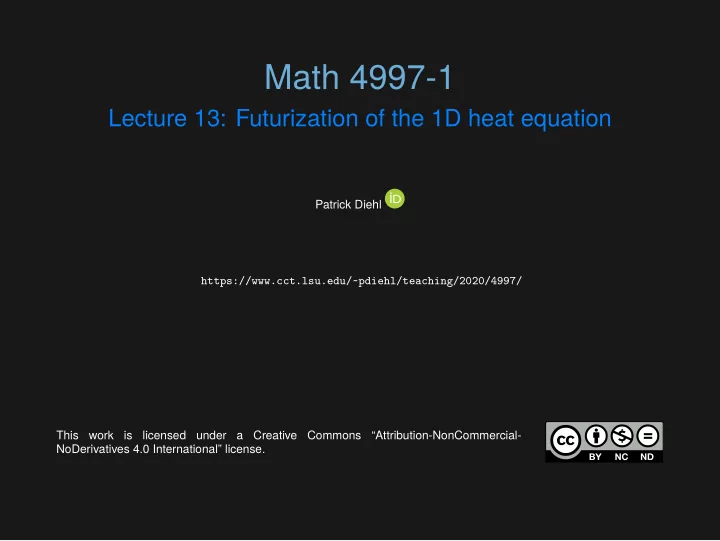

Math 4997-1 Lecture 13: Futurization of the 1D heat equation Patrick Diehl https://www.cct.lsu.edu/~pdiehl/teaching/2020/4997/ This work is licensed under a Creative Commons “Attribution-NonCommercial- NoDerivatives 4.0 International” license.
Reminder HPX features Scaling results Summary
Reminder
Lecture 12 What you should know from last lecture equation ◮ One-dimensional heat equation ◮ Serial implementation of the one-dimensional heat
HPX features
A ready future Some times, we need a future, which is already ready, since there is no computation needed. hpx::lcos::future<double > f = hpx::make_ready_future(1); Example auto f = hpx::make_ready_future(1); /* * Since the future is ready the output will happen * and there will be no barrier. */ std::cout << f.get() << std::endl;
Data fmow I std::vector<hpx::lcos::future<int>> futures; futures.push_back(hpx::async(square ,10)); futures.push_back(hpx::async(square ,100)); // When all returns a future containing the vector // of futures hpx::when_all(futures).then([](auto&& f){ // We need to unwrap this future to get // the content of it auto futures = f.get(); int result = 0; for(size_t i = 0; i < futures.size();i++) result += futures[i].get(); std::cout << result << std::endl; });
Data fmow II hpx::dataflow(hpx::launch::sync ,[](auto f){ int result = 0; for(size_t i = 0; i < f.size();i++) result += f[i].get(); std::cout << result << std::endl; },futures); Parameters 2. The function to call 3. Futures to the arguments to the arguments of the function 1. hpx::launch::async or hpx::launch::sync
Passing futures void sum(int first, int second){ std:: cout << first + second << std::endl; } auto f1 = hpx::async(square ,10); auto f2 = hpx::async(square ,100); // We have to call .get() to pass // the values of the future sum(f1.get(),f2.get());
Unwrapping futures void sum(int first, int second){ std:: cout << first + second << std::endl; } // We can unwrapp the function auto fp = hpx::util::unwrapping(sum); // After unwrapping , we can pass the future // directly to the function hpx::dataflow(hpx::launch::sync,fp,f1,f2);
Shared future ownership model Can be seen to be equal to std::unique_ptr and zero references. destroyed if there are the object is only object are counted and std::shared_ptr . hpx::lcos::future hpx::shared_future available anymore. scope, it will be not model ◮ Reference counting ◮ Exclusive ownership ◮ All references to the ◮ If the future is out of the
Scaling results
Overhead Grid points Serial 1 CPU Execution time Futurization 100 80 60 40 20 0 0 0 . 2 0 . 4 0 . 6 0 . 8 1 · 10 7
Scaling Grid points 4 CPU 2 CPU 1 CPU Stencil 2 Execution time 6 CPU 100 80 60 40 20 0 0 0 . 2 0 . 4 0 . 6 0 . 8 1 · 10 6
Summary
Summary After this lecture, you should know ◮ hpx::make_ready_future ◮ hpx::dataflow ◮ hpx::util::unwrapping ◮ hpx::shared_future
Recommend
More recommend